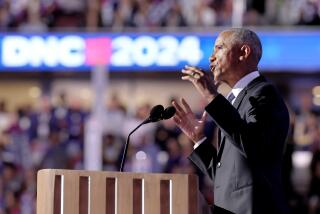Top aide urged Clinton to paint Obama as foreign
- Share via
WASHINGTON — Eager to take down Hillary Rodham Clinton’s toughest opponent for the Democratic presidential nomination, a top aide came up with a novel -- and hard-edged -- strategy.
In a March 2007 memo to the candidate, Mark Penn, a longtime pollster and strategist for the Clintons, urged the New York senator’s campaign to paint Barack Obama as “fundamentally” foreign.
Clinton never embraced that theme, preferring instead to cast Obama as untested and too inexperienced to be commander in chief. But the memo shows the range of options being considered as Obama’s campaign gained momentum at Clinton’s expense.
The Penn paper is part of a sheaf of e-mails and documents obtained by the Atlantic and made available on the magazine’s website.
The March 19, 2007, memo included a section titled “Lack of American Roots,” in which Penn recommended making an issue of Obama’s “diverse, multicultural” upbringing. Obama was born in Hawaii and spent part of his childhood in Indonesia before returning to Hawaii to live with his grandparents.
Obama’s “roots to basic American values and culture are at best limited,” Penn wrote. “I cannot imagine America electing a president during a time of war who is not at his center fundamentally American in his thinking and his values.”
To avoid an overt attack, Penn recommended emphasizing the word “American” in Clinton’s various campaign messages -- drawing a contrast to Obama but in subtler form.
“Let’s explicitly own ‘American’ in our programs, the speeches and the values. He doesn’t,” Penn wrote. “Make this a new American Century, the American Strategic Energy fund. Let’s use our logo to make some flags we can give out. Let’s add flag symbols to our backgrounds.”
A Clinton spokeswoman said Tuesday that Penn’s recommendation was rejected.
“Sen. Clinton did not take that advice,” Kathleen Strand said. “She focused primarily on issues that mattered to working families. This was a strategy that was not employed, discussed by senior staff or even pushed by Mark Penn.”
Penn, chairman of Burson-Marsteller, a public relations and lobbying company, did not return calls for comment.
Penn’s strategy was considered but dismissed, said a former campaign aide who spoke on condition of anonymity in order to be more forthcoming.
“Even if you concluded it would be a useful line of attack, some of us were queasy about it,” he said. “It’s fair to say that most people thought it would really rebound on her.”
But Clinton did adopt another of Penn’s suggestions from the memo: that she emphasize that she was born in “the middle of America to the middle class in the middle of the last century.” This would be another way, Penn said, to draw a contrast with Obama’s upbringing “without turning negative” -- and Clinton often repeated such phrases on the campaign trail.
The release of the memos comes at a sensitive time in the presidential race. Both Clinton and her husband are to speak at the Democratic National Convention in Denver this month, and reminders of hard-nosed tactics urged by her former chief strategist could undermine the image of unity the party wants to project.
Obama has had difficulty winning over Clinton loyalists, and some of her fundraisers and supporters have refused to embrace his candidacy. The presumptive Republican nominee, Sen. John McCain, appears to have settled on a different way of targeting his Democratic rival: In a just-released Web ad, the McCain campaign shows ordinary people swooning over the Illinois senator -- part of a strategy of defining Obama as a high-wattage celebrity, not a presidential-caliber leader.
Within Clinton’s top circle, aides were divided over how to counter the Obama threat. Penn and former President Clinton urged a combative approach; other aides counseled against direct attacks.
A Penn memo dated March 30, 2008, when Clinton was trailing in the delegate count, warned that she could not afford to play “nice.” The memo said that superdelegates -- the party activists whose votes would be needed to clinch the nomination -- should be shown that Obama was a “doomsday scenario.” Penn recommended invoking the fiery language that the Rev. Jeremiah A. Wright Jr., Obama’s longtime pastor, had used in sermons.
“Many people . . . believe under the surface that 20 years sitting there with Goddamn America would make [Obama] unelectable by itself,” Penn wrote. “What does that say about his leadership that he never left or complained?”
Other memos demonstrate a lack of preparation and foresight by Clinton’s advisors. For example, aides had anticipated that the race would be decided in Clinton’s favor on “Super Tuesday,” Feb. 5. It wasn’t. On the eve of the day when the voters in 24 states were making their choices, senior advisor Harold Ickes sent out an e-mail revealing that the campaign had done little polling in the states holding contests after Super Tuesday.
“We are in for a real fight, but assuming she at least achieves the projections for Tuesday and given some breaks, it is a fight that she can win,” Ickes wrote.
After Super Tuesday, Clinton lost 10 contests in a row.
--
More to Read
Get the L.A. Times Politics newsletter
Deeply reported insights into legislation, politics and policy from Sacramento, Washington and beyond. In your inbox twice per week.
You may occasionally receive promotional content from the Los Angeles Times.










